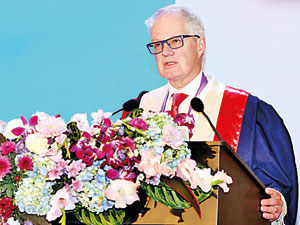News
Sri Lanka’s pathology success story under threat due to brain drain
View(s):- CPSL President gives multi-faceted strategy as way forward to ensure sustainability of service
Addressing a matter of “profound” significance that affects the future of healthcare, the President of the College of Pathologists of Sri Lanka (CPSL), Dr. Priyanka Abeygunasekara urged “collective action”.
‘Breaking the Chain: Battling Brain Drain in Histopathology in Sri Lanka’ she had chosen as her topic at her induction as CPSL President and inauguration ceremony of the 9th International Conference (ICON 2024) on October 16.
The conference was organised by the CPSL and the Sri Lankan British School of Pathology.

At the head-table (from the left): CPSL Joint Secretary Dr. Niluka Ranatunge; CPSL President-elect Prof. Priyani Amarathunga; Chief Guest Prof. Chandu de Silva; CPSL President Dr. Priyanka Abeygunasekara; Guest of Honour Prof. Ian O. Ellis; CPSL President-2022 Dr. Sonali Rodrigo; and ICON 2024 Coordinator Dr. Avanthi Rajapakse. Pix by M.A. Pushpa Kumara
Focusing on the migration of skilled professionals from Sri Lanka, Dr. Abeygunasekara said it is not a new phenomenon, but its impact on the field of pathology is becoming increasingly profound. This exodus of talent, particularly from among the brightest and most promising pathologists, threatens the very future of this specialty in the country.

Guest of Honour Prof. Ian O. Ellis
Looking at the causes, consequences and potential solutions to this challenge, she said that the pathology success story in the country is now under threat. Currently, there are only 53 board-certified histopathologists serving in the Health Ministry, with 42 concentrated in the Western, Central and Southern Provinces, leaving just 11 to cover the remaining provinces.
Many peripheral stations are supported by senior registrars and acting pathologists prior to board certification. The current ratio of pathologists is 73 to a population of 23 million – each pathologist serving around 315,000 people. This is while 20 pathologists serve in the university system under the Higher Education Ministry, she said.
In 2017, there had been 70 Health Ministry pathologists. Despite the expansion of the healthcare system and an increase in surgeons and surgical specialties, the number of pathologists had notably decreased.
“The Post-Graduate Institute of Medicine (PGIM) trains about 20 pathologists annually, but only 2–3 return to the country each year following foreign training, which is disheartening,” said Dr. Abeygunasekara, explaining that while some may argue that this is a natural outcome of globalization, the reality is that the loss of skilled pathologists is creating a void that is difficult to fill. The effects are felt in every corner of the healthcare system, from diagnostic delays to a decline in the quality of education and research.
Regarding the causes of brain drain, she said it is driven by a complex interplay of factors. Economic opportunities, better working conditions and access to advanced technology are often cited as the primary reasons for migration. However, there are deeper issues at play such as inadequate infrastructure, limited opportunities for career advancement, and a lack of recognition of the vital role that pathologists play in healthcare.

Chief Guest Prof. Chandu de Silva
“The challenges faced by the healthcare system, including resource constraints and administrative hurdles also play a role, while the global demand for skilled pathologists, particularly in developed countries, has created an attractive pull factor,” she said.
The consequences of this brain drain, according to her, are far-reaching and deeply concerning. It leads to shortages in the healthcare system which, in turn, result in increased workloads for those who remain, leading to burnout and in some cases, further departures. Diagnostic delays in centres that are already understaffed become inevitable. Limited opportunities for sub-specialization and career advancement compound the problem. With fewer experienced pathologists available to teach, the quality of training for the next generation is compromised. This creates a vicious cycle.
Dr. Abeygunasekara warned that the brain drain threatens the sustainability of the healthcare system. Without a steady pipeline of trained pathologists, there is a risk of decline in the quality of patient care. The loss of skilled pathologists also hinders research and innovation, reducing the ability to contribute meaningfully to global advancements in pathology.
Dealing with the ‘human cost of brain drain’, she said that for every pathologist who leaves, there is a family left behind, a community that loses a contributor and a nation that loses a valuable asset. The loss of skilled pathologists is a sad reminder of the challenges we face as a nation. It is a reflection of the systemic issues that need to be addressed, but it is also a call to action.
Giving possible solutions and the way forward, Dr. Abeygunasekara said the need is a comprehensive, multi-faceted strategy. Starting with a commitment to improving working conditions and career prospects for pathologists, it should also include investing in infrastructure, ensuring access to the latest technology and offering opportunities for continuous professional development.

CPSL President Dr. Priyanka Abeygunasekara addressing the gathering
“Fostering a culture of recognition and respect for the critical role played by pathologists in healthcare is important, while incentive programmes, both financial and non-financial for those who choose to work in underserved or remote areas would also help. These incentives could include scholarships, concessionary loans, housing support and career advancement opportunities,” she said, explaining that return migration programmes could also play a pivotal role.
“We must address the root causes of migration by working to improve the overall socio-economic conditions in our country. This requires a collective effort, not just from the healthcare sector, but from all levels of government and society,” she added.
The best way to say that you found the home of your dreams is by finding it on Hitad.lk. We have listings for apartments for sale or rent in Sri Lanka, no matter what locale you're looking for! Whether you live in Colombo, Galle, Kandy, Matara, Jaffna and more - we've got them all!

